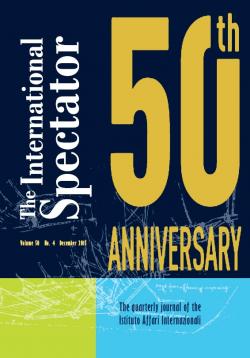The International Spectator, Vol. 50, No. 4, December 2015

Special 50th Anniversary Issue
The Outlook for Italian Foreign Policy Free
Exploring some of the most talked about topics in the last 50 years, our most well-known authors take a look back with new articles and perspectives …
Cutting across the wide range of subjects on which the journal focuses, the articles in this special 50th anniversary issue have been chosen to illustrate the breadth of the journal’s analysis and the extent of the changes that have taken place in the last fifty years. The authors are all internationally recognized. The intention is to highlight what The International Spectator is about, what it has achieved and how it has traced and analysed academic and policy developments in its fields of interest.
While continuing in this endeavour, the journal is broadening its horizons beyond its traditional interests (European integration, political economic policy, transatlantic relations, and such specific geographic areas as the Middle East, Balkans and North Africa). In fact it is increasingly focusing on issues on the current and future political agendas (Asia, climate, energy, and migration) so as to provide scholars and practitioners with a working tool in the field of international affairs, foster debate in opinion - and decision-making circles and make Italy’s voice heard internationally.
-
Numero
50/4



